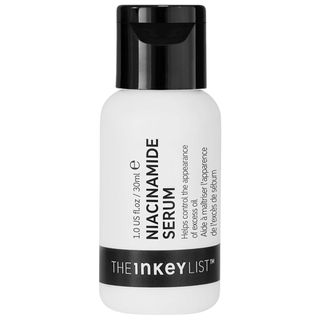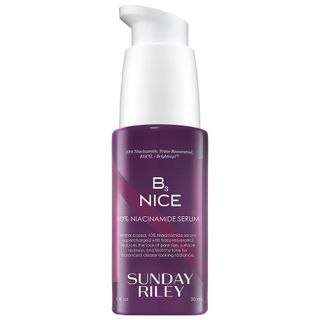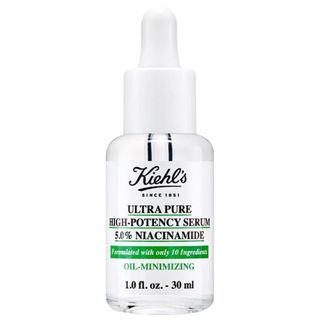Niacinamide Should Be in Your Skincare Routine—Here’s Why


There are skincare ingredients that are really good at doing one or two things—think hyaluronic acid for hydrating and plumping the skin or vitamin C for providing antioxidant protection and brightening effects. Then, there are skincare ingredients that are really good at doing a lot of things—think skin-transforming retinol or the true multitasker that is niacinamide.
I don’t think people realize the diversity of skin issues and concerns that niacinamide can fix. Redness and irritation? Yes. Blackheads and enlarged pores? Totally. Dark spots and hyperpigmentation? You better believe it.
It’s no wonder why dermatologists love it so much. That goes for Geeta Yadav, MD, board-certified dermatologist and founder of FACET Dermatology, who says, “Niacinamide has many, many benefits and it’s worthy of the hype!” Keep scrolling to learn everything there is to know about this superstar ingredient.

What Is Niacinamide and How Can It Benefit the Skin?
First things first. Yadav says that what we refer to as niacinamide is actually a naturally occuring form of vitamin B3. It’s often derived from grains for use in skincare products, and it offers extensive benefits for all skin types. We’re not kidding. It can benefit almost anyone, regardless of skin type or concern. It’s even pregnancy-safe. “While you should always ask your OB-GYN before using anything new while pregnant, niacinamide is regarded as pregnancy-safe,” Yadav says. “It’s a nice do-it-all option to have in your arsenal during pregnancy when your skincare choices are a little limited!”
As for the specific benefits…get ready. “Niacinamide can help soothe inflammation and redness, promote more hydrated skin, help balance oil production, even skin tone, and so much more,” Yadav says. Let’s take a deep dive into a few of our favorite benefits—specifically, the redness-alleviating, pore-reducing, and hyperpigmentation-erasing ones.
- Redness: Niacinamide is anti-inflammatory, meaning it can help soothe and minimize redness of all kinds—including redness from inflammatory acne. Yep. Take it from Yadav. “Niacinamide has anti-inflammatory properties that make it ideal for use by those who have red, inflamed skin, especially those with inflammatory acne,” she says. “Niacinamide can actually down-regulate the inflammatory responses triggered by acne.”
- Enlarged Pores: Large, dark pores got you down? Yadav says niacinamide is the fix. “Niacinamide supports enhanced exfoliation, both on the surface of the skin (like an alpha-hydroxy acid) and within the pore (like salicylic acid). This helps sebum flow more efficiently through the pores, making them appear smaller.”
- Hyperpigmenation: Maybe you’re dealing with an uneven skin tone smattered with dark spots. Yep, niacinamide can help—even if you have a stubborn skin condition like melasma. “Niacinamide is shown to inhibit the transfer of melanosomes (subcellular structures that create and transport skin pigment, melanin) from melanocytes (the skin cells that produce melanin) to keratinocytes (the cells that make up the majority of the outer layer of skin),” Yadav says. “Doing this decreases hyperpigmentation.”

How Often Should Niacinamide Be Used?
Knowing all the benefits of niacinamide really makes us want to soak our skin in it, but first, we need to know whether it’s safe for daily use. Luckily, Yadav says it is—twice daily, actually. “It can absolutely be used both morning and night,” she says. “Niacinamide has antioxidant properties, so applying niacinamide in the AM will give you that dose of free radical defense you need to protect your skin from environmental aggressors throughout the day.”
It also plays well with other active ingredients. “For the most part, you can combine niacinamide with any active ingredient, Yadav says. “Though, you want to be cautious if you’re prone to sensitivity, especially if you’re choosing to combine niacinamide with other potentially skin-sensitizing ingredients, like AHA/BHA/retinoids, or even vitamin C.” In other words, take it slow. If you’ve never used a niacinamide skincare product before, avoid applying it alongside the aforementioned ingredients until you know your skin tolerates it well.

Are There Any Drawbacks or Downside to Using Niacinamide?
Yadav says there’s only one downside to using niacinamide, and it’s entirely theoretical. It’s generally very well tolerated, but sensitive skin could still react to it. “Some individuals, especially those with sensitive skin, may find that it causes their skin to flush or get irritated, particularly at high concentrations,” she says. To avoid irritation, start off by using a lower percentage of niacinamide and introduce it into your skincare routine slowly. As always, it’s a good idea to patch-test a new skincare product before slathering it on your skin.

(Image credit: @emmahoareau)
What Percentage of Niacinamide Should You Look For in a Skincare Product?
With so many niacinamide-spiked skincare products out there, it’s difficult to deduce which one will work for your skin. Luckily, Yadav has some pointers. “A concentration around 5 percent will yield the best results without increasing the risk of skin irritation,” she says. “Many people don’t experience irritation until they go past 10 percent, which I would say is the top concentration you should consider. If you have sensitive skin, I’d recommend starting at a lower concentration and working your way up.”
The Best Niacinamide Skincare Products

Paula’s Choice
10% Niacinamide Booster
Yadav says this is her top niacinamide recommendation. “I like this product from Paula’s Choice because it makes it very easy to try niacinamide without disrupting the rest of your skincare routine,” she says. “It’s a booster that you can add to other formulas you already use. In addition to containing niacinamide, it also contains known skin-brightening ingredients licorice and vitamin C.”

Dieux
Deliverance Antioxidant & Niacinamide Serum for Calm & Even Skin
This serum combines 4% niacinamide with an antioxidant blend (an infusion of encapsulated cannabinoids, water lily, and green tea) and peptides. Over time, this smooths, firms, calms, and brightens the skin.

Glow Recipe
Watermelon Glow Niacinamide Dew Drops Serum
An innovative formula, this serum reduces the look of hyperpigmentation for a dewy, glass-finish glow—without mica, glitter, or gray cast.

The Ordinary
Niacinamide 10% + Zinc 1% Oil Control Serum
You can’t go wrong with trying The Ordinary’s niacinamide serum. At only $6 a pop, it won’t break the bank but it will reduce oil and minimize the appearance of pores.

The INKEY List
Niacinamide Oil Control Serum
Another budget-friendly pick, this serum contains 10% niacinamide and 1% hyaluronic acid. It promises to control excess oil, reduce blemishes, and minimize redness—all while hydrating the skin.

Sunday Riley
B3 Nice 10% Niacinamide Serum
With 10% niacinamide and trans-resveratrol, this serum offers the skin myriad benefits, including brightening, mattifying, and redness-reducing benefits.

Farmacy
10% Niacinamide Night Mask
10% niacinamide, 3% panthenol, beta-glucan, and blueberry seed oil makes this overnight mask a skin-transforming secret weapon. It smooths, evens texture, balances oil, hydrates, and revives the skin. Simply apply it and go to sleep.









